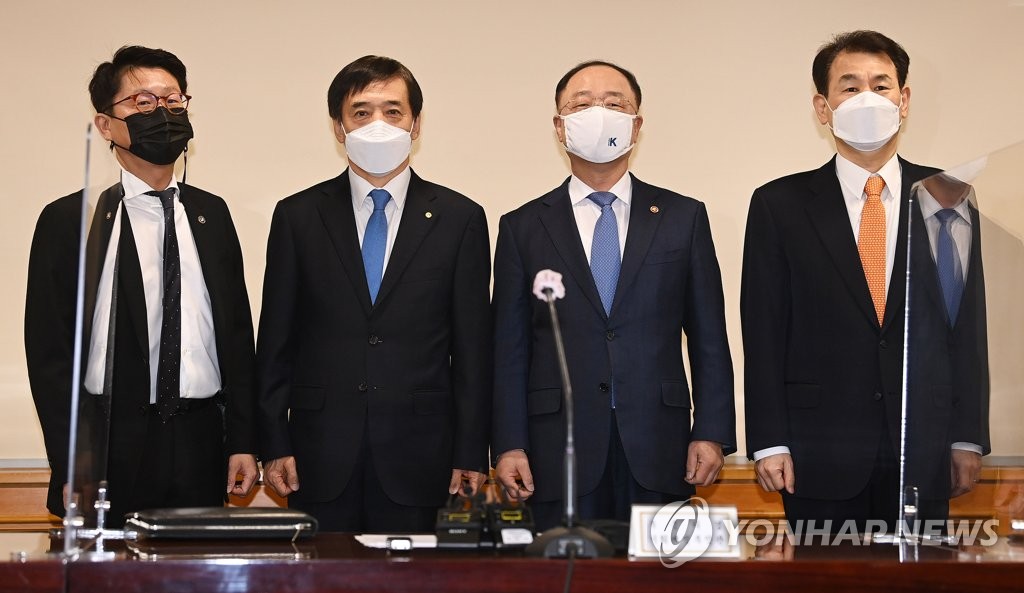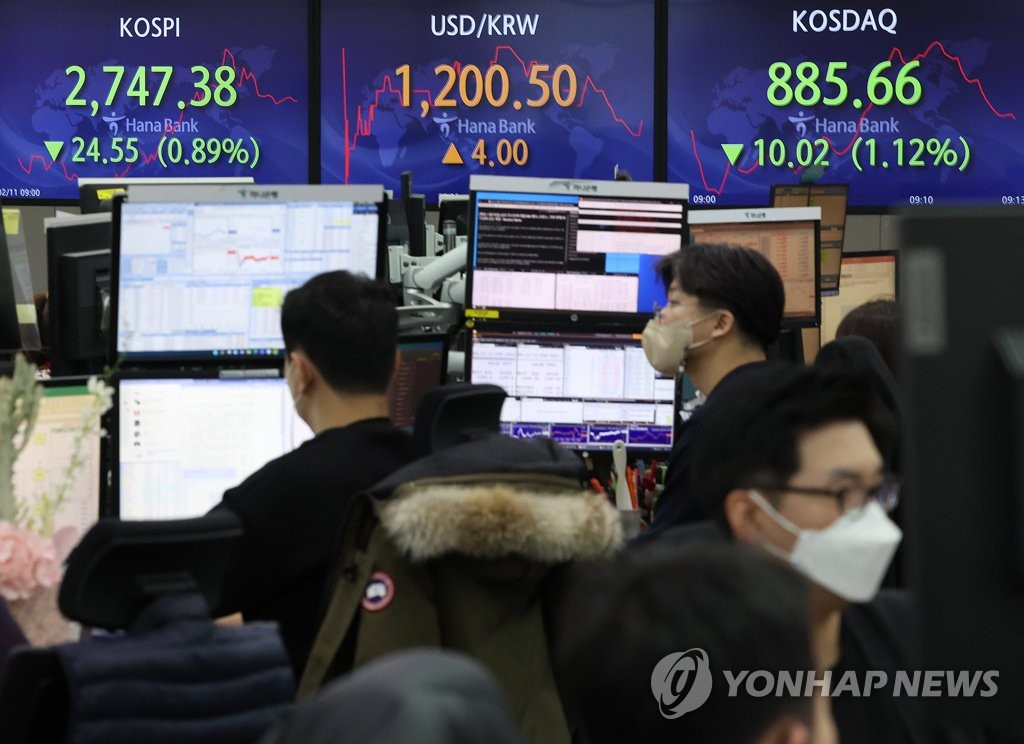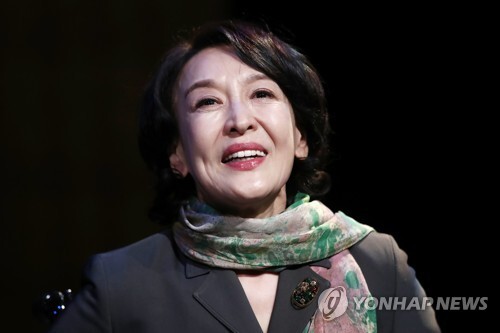 |
| ▲ Finance Minister Hong Nam-ki (2nd from R) poses for a photo before the start of a policy coordination meeting with Bank of Korea Gov. Lee Ju-yeol (2nd from L), Doh Kyu-sang, vice chairman of the Financial Services Commission (L), and Jeong Eun-bo, chief of the Financial Supervisory Service, on Feb. 11, 2022. (Pool photo) (Yonhap) |
 |
| ▲ Electronic signboards at a Hana Bank dealing room in Seoul show the benchmark Korea Composite Stock Price Index (KOSPI) opened 1.18 percent lower at 2,739.14 on Feb. 22, 2022. (Yonhap) |
(LEAD) economic policymakers-policy coordination
(LEAD) Gov't, BOK to cooperate to ease bond market jitters, curb inflation
(ATTN: RECASTS throughout with more details; CHANGES headline and photos)
SEOUL, Feb. 11 (Yonhap) -- South Korea's government and central bank agreed Friday to push for measures to ease jitters in the bond market and cooperate to curb growing inflationary pressure amid surging energy costs.
The consensus was reached in a meeting presided over by Finance Minister Hong Nam-ki to discuss with the central bank chief and financial regulators economic risk factors, market volatility, financial imbalances and the economic fallout of political tensions between Russia and Ukraine.
"We will closely cooperate to operate fiscal, monetary and financial policies in a concerted manner to harmonize various policy goals," the participants said in a joint statement.
Bank of Korea (BOK) Gov. Lee Ju-yeol; Doh Kyu-sang, vice chairman of the Financial Services Commission (FSC); and Jeong Eun-bo, chief of the Financial Supervisory Service, attended the meeting. Doh joined the meeting instead of FSC chief Koh Seung-beom as Koh tested positive for COVID-19.
To stabilize the government bond market, the Bank of Korea (BOK) will seek to further buy Treasuries and adjust the monthly sale of monetary stabilization bonds. The bank bought state bonds worth 2 trillion won Monday to ease market jitters.
Bond yields of three-year government bonds have recently spiked amid the BOK's monetary tightening and global rises in bond yields. Returns of such debt rose 6.6 basis points to 2.303 percent Tuesday, the highest in nearly four years.
The South Korean economy is on a recovery track, but it faces heightened external economic risks amid surging oil prices and the prospect that the Federal Reserve will likely accelerate monetary tightening.
"Volatility could increase related to interest rates, foreign exchanges and cross-border capital flows, and asset prices could fall. This could cause negative spillover into household debt, the self-employed and the non-banking sector," Hong said at the meeting.
The participants also agreed to cooperate in stabilizing consumer prices in the first half with a focus on curbing inflation expectations and core inflation.
In January, consumer prices rose 3.6 percent from a year ago, compared with a 3.7 percent on-year gain in December last year. Consumer inflation grew more than 3 percent for the fourth straight month. The BOK aims to keep annual inflation at 2 percent over the medium term.
Higher oil prices and the won's weakness have boosted the country's import bills, putting upward pressure on inflation.
Oil prices have spiked on tight supplies and escalating geopolitical tensions between Russia and Ukraine.
Dubai crude, South Korea's benchmark, soared to $90.91 per barrel Monday, up from $77.12 at the end of last year. South Korea depends mainly on imports for its energy needs.
The policymakers also discussed economic contingency plans to brace for the potential deterioration of the Ukraine crisis.
They raised the need to swiftly decide whether to normalize eased foreign exchange liquidity rules for banks and check the FX liquidity situation at non-banking institutions.
In a separate meeting on the Ukraine issue, the government said it will devise detailed preemptive steps to minimize potential impacts on the Korean economy.
The measures include the enhanced monitoring of global energy prices and extending backing to the country's exporters, according to the finance ministry.
(END)
(C) Yonhap News Agency. All Rights Reserved















![[가요소식] 존박, 8년만 단독 콘서트 '꿈처럼' 성료](https://korean-vibe.com/news/data/20251222/yna1065624915961730_125_thum.jpg)







